| A History Of Modern Aesthetics : V.1: The Eighteenth Century; V.2: The Nineteenth Century; V.3: The Twentieth Century |
| | ISBN: 9781107643222 | Price: 350.00 | | |
| Volume: | Dewey: 111/.850903 | Grade Min: | Publication Date: 2014-03-10 | |
| LCC: 2013-050046 | LCN: BH151 .G89 2014 | Grade Max: | Version: | |
| Contributor: Guyer, Paul | Series: | Publisher: Cambridge University Press | Extent: 1752 | |
| Contributor: | Reviewer: Roman Bonzon | Affiliation: Augustana College | Issue Date: April 2015 | |
| Contributor: | | | | |
 Magisterialis the word that inevitably will be used to describe this three-volume work. It is a detailed examination of philosophical ideas concerning people's experience of art and aspects of nature as developed and considered in Germany and Britain from the 18th to 20th century, in France in the 18th century, and in the US in the 20th century. The historical investigations are organized around three focuses: the idea of art as an attempt to provide a distinctive kind of cognitive experience, a contrasting focus on art as essentially enmeshed in human emotions, and a third concern with its engagement involving the playful exercise of imagination. Guyer (Brown) sets the stage with a discussion of the ancient debate between Plato and Aristotle on the function of art. He then proceeds through the main figures of his survey (Hutcheson to Hume, Burke, Kant, Hegel, Ruskin, Nietzsche, Heidegger, Croce, Collingwood, Dewey, and Wittgenstein), ending with the Americans Danto and Cavell. Guyer's treatment is essentially a close analysis of these philosophers' central texts, situated in the context of their intellectual backgrounds and in relation to his three organizing principles.Summing Up: Highly recommended. Upper-division undergraduates and above. |
| Aquinas On Beauty : |
| | ISBN: 9780739184240 | Price: 126.00 | | |
| Volume: | Dewey: 111/.85092 | Grade Min: | Publication Date: 2015-02-12 | |
| LCC: 2014-047124 | LCN: B765.T54S428 2015 | Grade Max: | Version: | |
| Contributor: Sevier, Christopher Scott | Series: | Publisher: Lexington Books/Fortress Academic | Extent: 240 | |
| Contributor: | Reviewer: William P. Haggerty | Affiliation: Gannon University | Issue Date: September 2015 | |
| Contributor: | | | | |
 This study offers an account of Saint Thomas Aquinass conception of beauty, the transcendental property associated with objects that, Thomas wrote, "please when seen. Though he did not neglect the subjective side in aesthetic perception, Thomas insisted that beauty was never merely in the eye of the beholder. Sevier (College of Southern Nevada) begins with an examination of the psychological factors involved in aesthetic experience, which entails an appreciation of the complex interplay between desire and pleasure within the human subject. In the central chapter, the author analyzes the objective features in the beautiful objectthose essential constituents (proportion, integrity, and clarity) that make particular beings so appealing to perceivers. In addition to tracing the source of these distinctions to the philosophical work of Plato and Pseudo-Dionysius, Sevier addresses the issue of whether Thomas considered beauty a separate transcendental property in relation to being, truth, and goodness. The author suggests that the answer to this textual question, whatever it is, does not affect Thomass final judgment that everything that exists isde facto also beautiful. Like its subject matter, this work is a model of proportion, integrity, and clarity.Summing Up: Highly recommended. Upper-division undergraduates through faculty. |
| Attention : |
| | ISBN: 9780415532228 | Price: 160.00 | | |
| Volume: | Dewey: 128.3 | Grade Min: | Publication Date: 2014-04-30 | |
| LCC: 2013-043302 | LCN: BF321 | Grade Max: | Version: | |
| Contributor: Wu, Wayne | Series: New Problems of Philosophy Ser. | Publisher: Taylor & Francis Group | Extent: 314 | |
| Contributor: | Reviewer: William Seager | Affiliation: University of Toronto | Issue Date: March 2015 | |
| Contributor: | | | | |
 Attention is a hot topic in cognitive science and philosophy. The link between consciousness and attention is especially vexing, but the role of attention in one's mental economies goes beyond consciousness. This careful and knowledgeable discussion by Wu (Carnegie Mellon Univ.) devotes considerable effort to examining whether attention might be required for consciousness (no definitive answer is given). Wu skeptically explores the recent theory of Jesse Prinz that consciousness is simply a form of attention, but he does not rule out that attention may be essentially related to consciousness (perhaps serving as a gatekeeper). Wu makes a strong case that information capacity accounts of attention do not easily account for the apparent experiential richness of ongoing conscious experience, as, for example, in one's experience of large spatial extents. Beyond constitutive questions about consciousness, Wu provides insights into how attention impacts agency, thought, epistemic justification, and introspective awareness. He is deeply acquainted with a vast range of empirical work but manages to keep philosophical issues clearly before the reader. The book is both a rich philosophical exploration of attention, and, now, with its clear and comprehensive accounts of classic and recent empirical work, the indispensable starting point for anyone with a philosophical interest in attention.Summing Up: Essential. Upper-level undergraduates through researchers/faculty. |
| Benjamin's Passages : Dreaming, Awakening |
| | ISBN: 9780823262564 | Price: 85.00 | | |
| Volume: | Dewey: 838/.91209 | Grade Min: | Publication Date: 2014-12-15 | |
| LCC: 2014-029447 | LCN: PT2603.E455Z6732 | Grade Max: | Version: | |
| Contributor: Gelley, Alexander | Series: | Publisher: Fordham University Press | Extent: 232 | |
| Contributor: | Reviewer: Gregg Daniel Miller | Affiliation: University of Washington, Tacoma | Issue Date: October 2015 | |
| Contributor: | | | | |
 Walter Benjamins star has only grown brighter and more intense in recent years. Though no single work can hope to capture the full range and depth of his panoramic gaze,Benjamins Passages is an exegetical masterwork, emphasizing conceptual constants and swerves over the too-short arc of Benjamins writing life. Gelley (comparative literature, Univ. of California, Irvine) draws on Benjamins most important works and on letters, autobiography, and the best of the secondary literature. Gelley's concise style and amplifications aid immensely with sampling Benjamins assortment of philosophic mind-benders. Where Benjamin is gnomic and hermetic, Gelley does not assert a clarity not immediately present. He draws linkages among the panoply of Benjamins decisive concepts: aura, weak Messianism, image, name-language. Gelley steers readers' attention to Benjamins fascination with the dregs, detritus, and outmoded, paradoxically disclosing revolutionary potential in the lived nihilism put into motion by the commodity cycle. Also key is Geller's special emphasis on Benjamin's singular notion of citationliterary but lived; the experiencing of being at once both in and out of ones own palimpsestic present uncovers political potential and hope in the play of retrieval and project.Summing Up: Highly recommended. Upper-division undergraduates through faculty. |
| Bound : Essays On Free Will And Responsibility |
| | ISBN: 9780199291847 | Price: 68.00 | | |
| Volume: | Dewey: 123.5 | Grade Min: | Publication Date: 2015-03-08 | |
| LCC: 2014-941106 | LCN: BJ1461 | Grade Max: | Version: | |
| Contributor: Nichols, Shaun | Series: | Publisher: Oxford University Press, Incorporated | Extent: 208 | |
| Contributor: | Reviewer: Jeffrey Glick | Affiliation: Texas A&M University-Kingsville | Issue Date: October 2015 | |
| Contributor: | | | | |
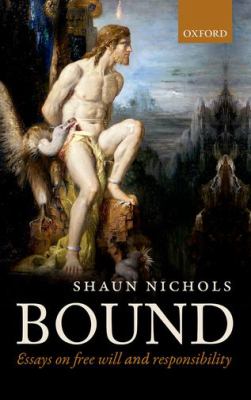 Few philosophy books are as diversely valuable to the discipline as this engaging volume on free will. Taking classic positions in the free will debate (e.g., hard determinism, compatibilism, libertarianism) and central concepts from that debate (retribution, causal explanation), Nichols (Univ. of Arizona) presents arguments and key concepts about those views against the background of cognitive science, the literature on which is burgeoning. The result is an exceptionally powerful reexamination of the origins of philosophical intuitions about determinism and free will, with direct attention to experimental data available from psychology. Those with a modicum of familiarity with the general contours of the free will debate will be able to use this book to advance their understanding of that subject. In addition, scholars at the highest levels will be seriously interested in Nichols's techniques, which rely on experimental philosophy to analyze the psychological motivations for the inferences and positions in the classic free will debate. The prose is lucid, the book is well organized, and the science and philosophy are seamlessly integrated.Summing Up: Essential. Lower-division undergraduates through faculty; general readers. |
| Consciousness And Moral Responsibility : |
| | ISBN: 9780198704638 | Price: 62.00 | | |
| Volume: | Dewey: 128.2 | Grade Min: | Publication Date: 2014-05-06 | |
| LCC: | LCN: BD418.3.L4 2014 | Grade Max: | Version: | |
| Contributor: Levy, Neil | Series: | Publisher: Oxford University Press, Incorporated | Extent: 174 | |
| Contributor: | Reviewer: Heidi Storl | Affiliation: Augustana College (IL) | Issue Date: July 2015 | |
| Contributor: | | | | |
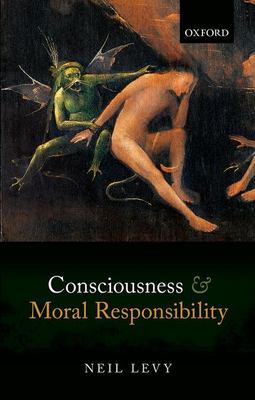 In six short chapters, Levy (Univ. of Oxford, UK) develops an argument that impacts not only work in scientific psychology but also two core issues in philosophy: the nature of human consciousness and the nature of moral responsibility. Perhaps too apologetically, Levy contends that he has "produced arguments that require the reciprocal engagement of science and philosophy" and that "instead of constraining my arguments by intuition (alone), they are constrained by, and responsive to, the data." Levy writes for the real world, and no apology is necessary. He advances the thesis that "consciousness of the moral significance of our actions is a necessary condition for direct moral responsibility." This may seem intuitive, but the thesis is under rigorous attack within cognitive science, neuroscience, and philosophy. Levys systematic attention to definitional and interpretive detail, extended case studies, response to critics from multiple disciplines, and fine-grained argument make this volume a potential paradigm shifter in discussions involving moral agency. Levy's conceptual and empirical groundwork results, convincingly, in a thesis that the role consciousness plays in behavior "entails that agents who lack creature consciousness cannot be morally responsible for their actions" because they do not express their evaluative agency or have control over their actions. Excellent bibliography.Summing Up: Essential. Upper-level undergraduates and above. |
| Dewey : |
| | ISBN: 9780415782746 | Price: 185.00 | | |
| Volume: | Dewey: 191 | Grade Min: | Publication Date: 2014-12-04 | |
| LCC: 2014-023953 | LCN: B945.D44F43 2014 | Grade Max: | Version: | |
| Contributor: Fesmire, Steven | Series: Routledge Philosophers Ser. | Publisher: Routledge | Extent: 278 | |
| Contributor: | Reviewer: Joshua Andrew Fischel | Affiliation: Millersville University | Issue Date: October 2015 | |
| Contributor: | | | | |
 Written with clarity and attention to detail, this biography by Fesmire (Green Mountain College) is a welcome introduction to the thought of the American philosopher John Dewey. Evenhanded and charitable throughout, this introduction avoids the easy dismissal and well-intentioned adulation that often plagued assessments of Deweys work throughout the 20th century. Beginning with an overview of Deweys life against the backdrop of its historical context, Fesmire goes on to analyze Deweys thought as it emerges through the various branches of philosophy, beginning with a chapter on his reconstructive metaphysics and moving from there to chapters on epistemology, ethics, social and political philosophy, educational philosophy, aesthetics and philosophy of technology, and philosophy of religion. Fesmire helpfully ends with a suggestive discussion of Deweys influence and legacy. This book is superb in showing the interconnectedness of Deweys philosophy, with each chapter building on the ideas developed in previous ones. Additionally, Fesmire provides a glossary, which will be helpful to first-time readers unfamiliar with the way Dewey employs certain key concepts. In summary, this introduction is a rich and thought-provoking walk through the philosophy of Dewey, which will surely benefit both students and scholars alike.Summing Up: Essential. All readers. |
| Empty Ideas : A Critique Of Analytic Philosophy |
| | ISBN: 9780199330812 | Price: 88.00 | | |
| Volume: | Dewey: 110 | Grade Min: | Publication Date: 2014-07-14 | |
| LCC: 2013-042262 | LCN: BD331.U49 2014 | Grade Max: | Version: | |
| Contributor: Unger, Peter | Series: | Publisher: Oxford University Press, Incorporated | Extent: 296 | |
| Contributor: | Reviewer: Katheryn Hill Doran | Affiliation: Hamilton College | Issue Date: June 2015 | |
| Contributor: | | | | |
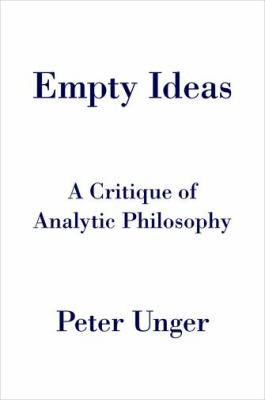 Empty Ideas, Unger's passionate indictment of Anglo-American analytic philosophywhich Unger also simply calls "mainstream philosophy"will interest practitioners and critics, and lovers and haters of that philosophical tradition alike. The central thesis of this volume by Unger (New York Univ.) is that at the heart of much of analytic philosophy lie "concretely empty ideas" that in no way affect "concrete reality." Or, as Unger argues in the best chapterchapter 7, "Individuals, Properties, and Time" (on David Lewis)the ideas "will be far more parochial than properly philosophical." The author does not stop there, of course: this book is dedicated to showing that such philosophy is terribly deficient by the historically dominant standards for philosophy itself (in contrast to pure mathematics, which, while also trafficking in concretely empty ideas, nevertheless offers substantial ideas about abstract reality). The nine chapters tackle the leading debates in contemporary (well, mid-20th century on) metaphysics and, to a lesser extent, epistemology. Each chapter is devoted to a dominant figure or figures and their role in a high-profile philosophical dispute. Unger is careful and generous with most of the positions he is criticizing. He succeeds in shifting the burden of proof onto analytic philosophy's defenders.Summing Up: Essential. Upper-level undergraduates and above. |
| From Empiricism To Expressivism : Brandom Reads Sellars |
| | ISBN: 9780674187283 | Price: 42.00 | | |
| Volume: | Dewey: 170/.42 | Grade Min: | Publication Date: 2015-01-06 | |
| LCC: 2014-008332 | LCN: B945.S444B73 2014 | Grade Max: | Version: | |
| Contributor: Brandom, Robert B. | Series: | Publisher: Harvard University Press | Extent: 304 | |
| Contributor: | Reviewer: John R. Shook | Affiliation: University of Buffalo | Issue Date: October 2015 | |
| Contributor: | | | | |
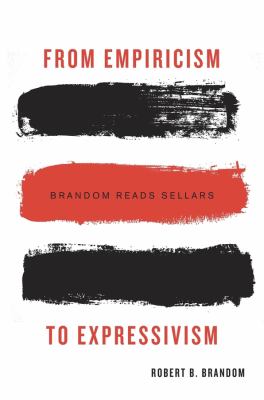 One of the leading US philosophers, Brandom (Univ. of Pittsburgh) develops his systematic views about language, knowledge, and the mind through a fascinating conversation with the work of Wilfrid Sellars (19121989), who influenced English-language philosophy as much as any 20th-century thinker. In Brandoms hands, the criticisms of empiricism Sellars developed are transformed into a set of powerfully coherent views. Empiricism and its prioritization of descriptive vocabulary obscures the normativity inherent to characterizing epistemic and semantic relations to the world and to the intentionality of mental states. Kant inspired Sellars to counter that modality; normativity and meaning permit any descriptive account of the world, so they are irreplaceable. Brandoms scrupulous, illuminating discussion of Sellarss search for a pragmatic and naturalistic alternative to empiricism should forever establish Sellarss lasting importance to analytic philosophy. This inspired interpretation of Sellars gradually transitions, chapter by chapter, into Brandoms thorough development of his own theory of pragmatic expressivism. As a masterwork of late analytic philosophy, this book must be studied as closely as Sellars by those interested in philosophy and linguistics.Summing Up: Essential. Upper-division undergraduates through faculty. |
| Love And War : How Militarism Shapes Sexuality And Romance |
| | ISBN: 9780231168403 | Price: 85.00 | | |
| Volume: | Dewey: 155.3 | Grade Min: 17 | Publication Date: 2014-10-28 | |
| LCC: 2014-008990 | LCN: BF692.D54 2014 | Grade Max: | Version: | |
| Contributor: Digby, Tom | Series: | Publisher: Columbia University Press | Extent: 240 | |
| Contributor: | Reviewer: Stephen J. Shaw | Affiliation: Antioch University Midwest | Issue Date: March 2015 | |
| Contributor: | | | | |
 Fresh, passionate, and long overdue, this book by Digby (Springfield College) offers an engaging analysis of the contrasting strands that comprise people's culturally programmed ideas about love. The first is that romantic love is a cultural ideal in which people live happily ever after and, at the same time, a "battle of the sexes." In today's militaristic (warrior) culture, men are conditioned to conquer the enemy by means of depersonalization. In the decline of actual (physical) combat, this has a natural societal spillover into ideas of gender and sexuality. Moreover, as one sees a trend of more women than men in higher education and a rise in misogyny in pornography, the "pool of viable partners for straight women" is steadily shrinking. What Digby recognizes on the horizon, though, is a "degendering of war" that leads to a "demilitarizing of gender." The social presence of women as soldiers coupled with the use of drone warfare (in which one tries to avoid civilian casualtiessigns of de-masculine empathy) will lead, one hopes, to an alignment and de-escalation in the false conflict between genders. Timely and vital, this volume presents complex ideas in simple language.Summing Up: Essential. Lower-division undergraduates and above; general readers. |
| On Romantic Love : Simple Truths About A Complex Emotion |
| | ISBN: 9780199370733 | Price: 30.99 | | |
| Volume: | Dewey: 128/.46 | Grade Min: | Publication Date: 2015-01-29 | |
| LCC: 2014-017757 | LCN: BD436.B755 2015 | Grade Max: | Version: | |
| Contributor: Brogaard, Berit | Series: Philosophy in Action Ser. | Publisher: Oxford University Press, Incorporated | Extent: 288 | |
| Contributor: | Reviewer: Amy Kind | Affiliation: Claremont McKenna College | Issue Date: July 2015 | |
| Contributor: | | | | |
 This tour de force by Brogaard (Univ. of Miami) aims at providing a theory of romantic love. It features a vast array of compelling examples drawn from pop culture, history, and everyday life, and draws on cutting-edge research not only in philosophy but also in psychology and neuroscience. Brogaard argues that love is an emotion that can be consciously experienced as a response of the body or mind but that can also occur unconsciously. In her view, love can come in degrees, can be assessed as both rational and irrational, and need not be directed exclusively at a single individual. Moreover, one may take deliberate steps to fall out of love with someone else and to heal oneself after heartbreak. Brogaards book is written to be accessible to general readers without sacrificing philosophical content. It offers more than enough interesting current theoretical work to merit serious attention by professional readers. Whimsical line drawings by illustrator Gareth Southwell add to the books appeal.Summing Up: Essential. Lower-level undergraduates and above; general readers. |
| Outside Color : Perceptual Science And The Puzzle Of Color In Philosophy |
| | ISBN: 9780262029087 | Price: 42.00 | | |
| Volume: | Dewey: 121/.35 | Grade Min: 17 | Publication Date: 2015-05-08 | |
| LCC: 2014-045729 | LCN: B105.C455C45 2015 | Grade Max: | Version: | |
| Contributor: Chirimuuta, Mazviita | Series: | Publisher: MIT Press | Extent: 264 | |
| Contributor: | Reviewer: John R. Shook | Affiliation: University of Buffalo | Issue Date: December 2015 | |
| Contributor: | | | | |
 Chirimuuta (history and philosophy of science, Univ. of Pittsburgh) understands the physics and cognitive science of color and color perception as well as any scientist. This book is a philosophical presentation of both the natural facts and their surprising implications. No, color is not a property of physical things outside oneself. No, color is not just about images within minds. Because colors exist where natural settings permit perceivers to dynamically engage with available energies, that entire context is where colors are. Colors cannot be reduced to any portion of that interacting whole. Colors are naturalized because they are relational and modal features of organic interactions with nature (adverbial) rather than static entities (phenomenal or representational), within or without perceivers. In the concluding chapters, Chirimuuta deals with philosophical rivals to this adverbial theory of color. Naïve realisms and simplistic representationalisms are overthrown by natural facts. Sophisticated phenomenological and neurophilosophical cousins are incorporated into the adverbial theory. The most important work on the philosophy of color and philosophy of perception published in recent decades, this book is for those interested in philosophy and cognitive science.Summing Up: Essential. Upper-division undergraduates through faculty. |
| Philosophy's Artful Conversation : |
| | ISBN: 9780674416673 | Price: 48.00 | | |
| Volume: | Dewey: 101 | Grade Min: | Publication Date: 2015-01-05 | |
| LCC: 2014-007448 | LCN: B842.R58 2014 | Grade Max: | Version: | |
| Contributor: Rodowick, D. N. | Series: | Publisher: Harvard University Press | Extent: 336 | |
| Contributor: | Reviewer: Alan D. Schrift | Affiliation: Grinnell College | Issue Date: May 2015 | |
| Contributor: | | | | |
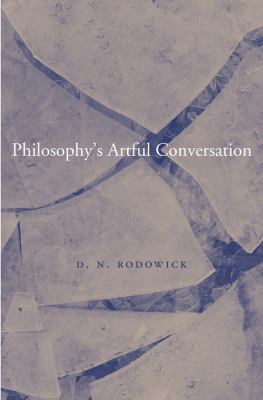 Rodowick (cinema and media studies, Univ. of Chicago; formerly, visual and environmental studies, Harvard) here completes a project that began withThe Virtual Life of Film (2007) and continued throughElegy for Theory (CH, Jun'14, 51-5487). His goal in this volume is to respond to the "post-theory" debate in film studies by arguing that "theory" has been unfairly framed as antithetical to the scientific model of rationality. Rejecting the scientistic account of rationality as the only possible account, Rodowick makes a case for philosophy to play the therapeutic role imagined by the late Wittgenstein as it offers a defense on ethical grounds of the humanities. Guided first and foremost by the work of Stanley Cavell, and placing it in provocative dialogue with Gilles Deleuze, Rodowick shows how "film philosophy" (in contrast to "film theory") exemplifies the possibility of a philosophy of the humanities that can escape the narrow focus on epistemology that has characterized analytic philosophy, and return philosophy to a more appropriate balance between epistemology and ethics, knowledge, and moral perfectionism. This is a very valuable book for anyone interested in film studies, philosophy, or the humanities.Summing Up: Highly recommended. Upper-level undergraduates through researchers/faculty. |
| Summers Of Discontent : The Purpose Of The Arts Today |
| | ISBN: 9781908524409 | Price: 14.95 | | |
| Volume: | Dewey: | Grade Min: | Publication Date: 2014-11-18 | |
| LCC: | LCN: NX65 | Grade Max: | Version: | |
| Contributor: Tallis, Raymond | Series: | Publisher: Bitter Lemon Press | Extent: 192 | |
| Contributor: Spalding, Julian | Reviewer: Francis A Grabowski | Affiliation: Rogers State University | Issue Date: June 2015 | |
| Contributor: | | | | |
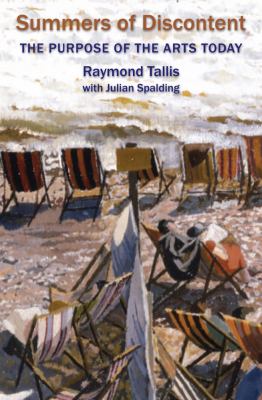 What is the purpose of art? Is it a human attempt to communicate with the divine? Or is it just fun? Many theories have been put forward to explain what art is for, but not one has met with universal, much less popular, acceptance. With the question as open as it is, fresh new perspectives are desperately needed. Enter philosopher and cultural critic Tallis (formerly, Univ. of Manchester, UK). People's lives, Tallis notes, are in a perpetual state of becoming: one never reaches a state of "being there." This is where art comes in. Art, Tallis insists, is a remedy for the human conditiona remedy that helps people arrive, allows people to live and be in the moment, and affords people a more complete, unified understanding of the world. One experiences the world; art, in turn, by putting one's experiences into relief, allows one to experiencethem. Reading this last sentence, one might think Tallis's book is intended only for professional philosophers. Rest assured, howeverhis prose is engaging and his arguments readily accessible, not to mention fairly compelling. Tallis writes with authority and a great command of the subject matter. His works, the present offering not excluded, are as entertaining as they are intellectually penetrating.Summing Up: Highly recommended. Lower-level undergraduates and above; general readers. |
| The Existentialist Moment : The Rise Of Sartre As A Public Intellectual |
| | ISBN: 9780745685397 | Price: 72.75 | | |
| Volume: | Dewey: | Grade Min: | Publication Date: 2015-07-20 | |
| LCC: 2014-043776 | LCN: B2430.S34B255 2015 | Grade Max: | Version: | |
| Contributor: Baert, Patrick | Series: | Publisher: Polity Press | Extent: 240 | |
| Contributor: | Reviewer: Cynthia B. Kerr | Affiliation: Vassar College | Issue Date: December 2015 | |
| Contributor: | | | | |
 What can explain Sartres extraordinary rise to celebrity status in the mid-1940s, and why did his form of existentialism gain such prominence at that specific time? To answer this two-pronged question, Baert (social theory, Univ. of Cambridge, UK) moves beyond the Bourdieusian perspective of Anna Boschetti's The Intellectual Enterprise (CH, Sep'88, 26-0184) and the network approach of Randall Collins'sThe Sociology of Philosophies (CH, May'99, 36-5015) to delve deep into the sociopolitical context of the period. Exploring not so much the tumultuous events surrounding the Occupation but rather the particular ways in which French intellectuals reacted to those events, the author argues that Sartre reformulated his earlier philosophical positions in response to the anguish of the debacle, armistice, collaboration, and purge. By writing about divisions that threatened to tear apart Frances social fabric and providing a new vocabulary to come to terms with the trauma of war, Sartre offered the French a way to move beyond profoundly disruptive and polarizing experiences. This original and compelling analysis of the Sartre phenomenon and what Simone de Beauvoir called the existentialist offensive of 1945 makes for fascinating reading. So does Baerts intriguing proposal that the same underlying theory of networks, conflict, and positioning applies to authoritative public intellectuals today.Summing Up: Essential. Lower-division undergraduates through faculty. |
| The Non-identity Problem And The Ethics Of Future People : |
| | ISBN: 9780199682935 | Price: 100.00 | | |
| Volume: | Dewey: 170 | Grade Min: | Publication Date: 2014-12-16 | |
| LCC: 2014-940445 | LCN: BJ1031 | Grade Max: | Version: | |
| Contributor: Boonin, David | Series: | Publisher: Oxford University Press, Incorporated | Extent: 320 | |
| Contributor: | Reviewer: Heidi Storl | Affiliation: Augustana College (IL) | Issue Date: September 2015 | |
| Contributor: | | | | |
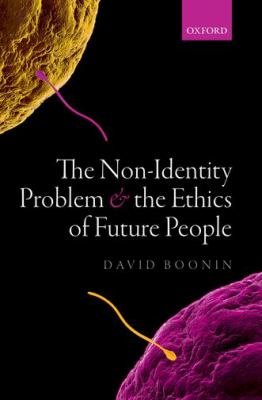 This fine-grained analysis of the "non-identity problem" focuses on a single, five-premised argument. This argument highlights the counterintuitive nature of the problem: five plausible premises are offered in support of a prima facie implausible conclusion. The non-identity problem first surfaced in its modern form in Derek Parfit'sReasons and Persons (CH, Nov'84); more recently, it played a prominent role in David Benatar'sBetter Never to Have Been: The Harm of Coming into Existence (2006). At its root, the problem raises both theoretical and practical concerns regarding human obligations to future individuals such as possible, particular children. In the end, Boonin (Univ. of Colorado) effectively dissolves the problem with his novel approach: examine the premises one by one, confirm their plausibility, and demonstrate the ultimate plausibility of the seemingly implausible conclusion. Throughout this careful examination, Boonin employs thoughtful case studies and thought experiments that serve to engage the reader in the analysis. The result is a book that is likely to put this philosophical quandary to rest.Summing Up: Essential. Upper-division undergraduates through faculty. |
| The Powers Of Pure Reason : Kant And The Idea Of Cosmic Philosophy |
| | ISBN: 9780226243153 | Price: 99.00 | | |
| Volume: | Dewey: 193 | Grade Min: | Publication Date: 2015-04-14 | |
| LCC: 2014-036406 | LCN: B2779.F47 2015 | Grade Max: | Version: | |
| Contributor: Ferrarin, Alfredo | Series: | Publisher: University of Chicago Press | Extent: 352 | |
| Contributor: | Reviewer: Daniel C. Kolb | Affiliation: St. Meinrad Archabbey Library | Issue Date: November 2015 | |
| Contributor: | | | | |
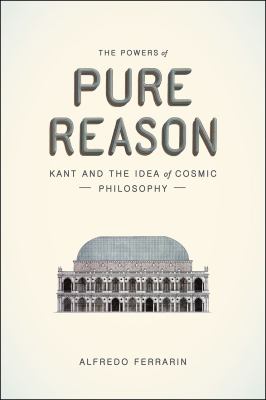 In this important book, Ferrarin (Univ. of Pisa, Italy) addresses issues concerning the inner dynamic and unity of Kants philosophy in its entirety. Ferrarin identifies the central unifying theme around which Kants thought is organized as the authority of reason. He proposes a general account of reason in its primordial form, before it is differentiated into the theoretical and practical branches of Kants system, and then traces reasons specification into constitutive principles, maxims, postulates, reflective principles, and regulative ideas. The author moves with surefooted assurance among the perspectives of the systematic whole and its parts. Drawing insights from every corner of Kants writings, Ferrarin adroitly balances systematic concerns with attention to historical development of Kants account of reason as he works through tensions and conflicts in the system. Ferrarins exposition of frequently ignored sections of Kants work, such as the "Transcendental Doctrine of Method" fromCritique of Pure Reason, and his sensitivity to Kants highly suggestive characterizations of reason as organism, architect, and systematizing force make this required reading for every serious student of Kant.Summing Up: Essential. Upper-division undergraduates and above. |
| Vainglory : The Forgotten Vice |
| | ISBN: 9780802871299 | Price: 14.00 | | |
| Volume: | Dewey: 241/.3 | Grade Min: | Publication Date: 2014-12-03 | |
| LCC: 2014-031193 | LCN: BV4627.P7D49 2014 | Grade Max: | Version: | |
| Contributor: Deyoung, Rebecca Konyndyk | Series: | Publisher: William B. Eerdmans Publishing Company | Extent: 167 | |
| Contributor: | Reviewer: Andrew Jaeger | Affiliation: Benedictine College | Issue Date: June 2015 | |
| Contributor: | | | | |
 In this superb book, DeYoung (Calvin College) takes up a thorough, though refreshingly simple, examination of the nature of the vice of vainglory. Although rather direct in her aim, she touches on ethics more broadly at points. She begins by discussing the conditions under which glory can be properly warranted. She then juxtaposes the varieties of ways in which glory can come "in morally twisted ways." Her mastery of this topic among contemporary authors is nearly beyond compare, and her book will serve undergraduates, graduates, and professional researchers for a wide range of purposes. DeYoung has published on ethics (with particular attention to the nature of vice) a number of times. For a good introduction to the nature of vice, see herGlittering Vices: A New Look at the Seven Deadly Sins and Their Remedies (2009). Vainglory is not an overly technical read; this is all the more impressive because the volume is also chock-full of original research that will serve both novices and professionals in the area of ethics.Summing Up: Essential. Lower-division undergraduates and above; general readers. |
| Waking, Dreaming, Being : Self And Consciousness In Neuroscience, Meditation, And Philosophy |
| | ISBN: 9780231137096 | Price: 32.95 | | |
| Volume: | Dewey: 128/.2 | Grade Min: 17 | Publication Date: 2014-11-18 | |
| LCC: 2014-004887 | LCN: B808.9T456 2015 | Grade Max: | Version: | |
| Contributor: Thompson, Evan | Series: | Publisher: Columbia University Press | Extent: 496 | |
| Contributor: Batchelor, Stephen | Reviewer: William Seager | Affiliation: University of Toronto | Issue Date: September 2015 | |
| Contributor: | | | | |
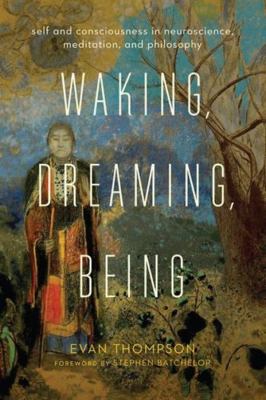 This remarkable book addresses deep philosophical questions from a unique perspective. Thompson (Univ. of British Columbia, Vancouver) is well known for his work in the nascent field of neurophenomenology, which seeks to broaden the scientific understanding of consciousness by admitting evidence based on subjective experience. His approach is further distinguished by its links to Eastern traditions of thought and meditative practices, of which he has a deep, comprehensive knowledge. Despite its conceptual sophistication and the range of empirical studies on which the author draws, the book is not primarily aimed at a scientific or an academic audience. Avoiding jargon and introducing terms from the arcane traditions of neuroscience and Buddhist philosophy with admirable clarity, Thompson explores the nature of consciousness, perception, dream experience, the self, and death. He convincingly shows how ancient Buddhist ideas are a source of new ways to understand the connection between consciousness and scientific understanding of the brain. He gently suggests that Western conceptions might benefit from input from these two traditions. Always judicious, Thompson avoids both the snare of credulous mysticism and the trap of reductive scientism. Enlivened by Thompson's illuminating reminiscences and personal anecdotes, this book will have a broad audience.Summing Up: Highly recommended. Lower-division undergraduates through faculty; general readers. |

























